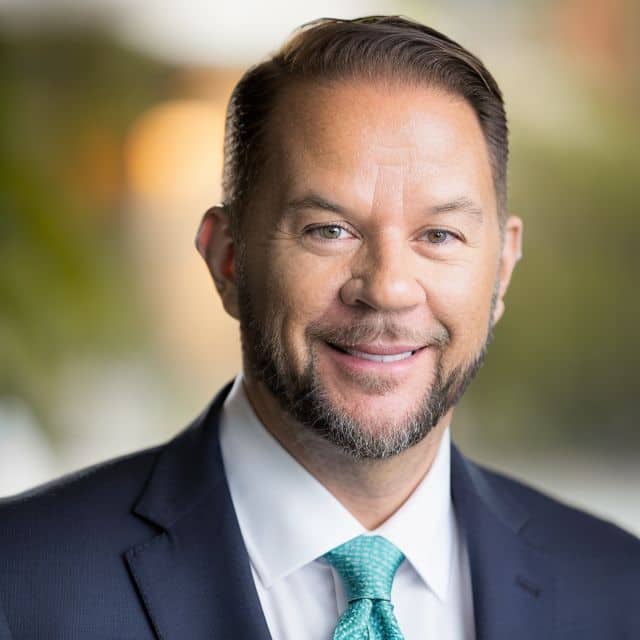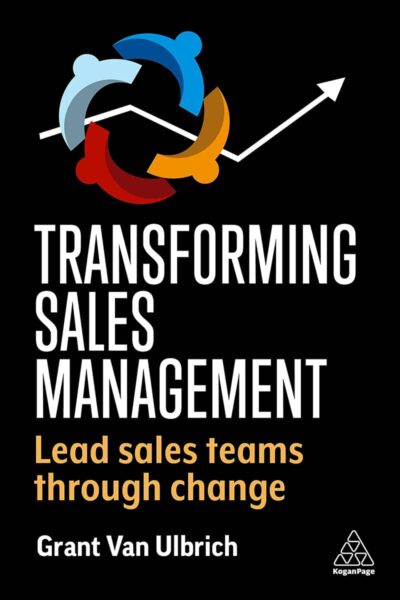Scared of change? So, what?
7th July 2023 | Nick de Cent
Grant van Ulbrich is Global Director of Sales Transformation at Royal Caribbean Group. His learning journey has taken him via a Master’s in Leading Sales Transformation to a doctorate in sales transformation, a new book, and the creation of a bespoke model for personal change.

Q: What motivated you to create a new personal change model for sales?
A: I moved to Europe for my new role in leading sales transformation at Royal Caribbean Group in 2018. Part of that role was to create a new sales manual for our global teams. However, after an extensive internal investigation, I uncovered that what we had was not truly fit for purpose to support selling in the future.
My leaders invited me to go to university with Consalia Sales Business School and Middlesex University here in London, as a way to learn the science and psychology behind sales so that I could build out a bespoke programme for our team’s personal development. Module 4 of the Master’s program is to take a deep dive into a transformational skillset needed to support our members. That skillset is change management.
In doing so, I rejected the current models and methodology as they were instructed for us to use on people. They were all prescriptive to say that, if we follow the models, people will somehow just accept the change and it will be implemented. That didn’t sit well with me due to my life experiences where I have rejected change on many occasions.
Feeling the direction given was inadequate and missing the individual’s own sense of purpose and belief, my professors challenged me to create a new model that would be inclusive of the individual involved. And that is just what I did. I wanted something that would be based out of science and psychology to support my sales team… not to be used on them without their involvement.
Q: How did you find time to create a new transformation model alongside the day job?
A: I honestly do not know where I found the motivation or drive to do it all, but I’m thankful how far I have come. This started out with my organization championing me to go to university to build something unique in sales transformation for us all. I did my day job and at nights I did my studies and research, and every single weekend I was diligently focused on my studies. Since 2018, I haven’t stopped.

The best part about the Sales Master’s programme is that it is a work-based study. This means that everything I learn, I take directly into my work as my research field and base. Really, they both went hand-in-hand and I started to become a practicing academic or “pracademic” as my professors coined it.
Once I graduated the masters with distinction for SCARED SO WHAT, my professors championed me to continue with the doctorate within Middlesex and focus on sales transformation. I was on a mission and couldn’t stop. Again, nights and weekends until I had created another new model for sales leadership I’ve called Tri2Lead. This model comes directly from my practice in how I’ve been able to pursue my work within Royal Caribbean Group not only in sales transformation, but during my entire career.
The book came immediately alongside the doctorate and post the completion of the doctorate. I just maintained my daily routine of work during the day and writing at night and weekends. If I reflect on where my drive has come from, I think it is because of several major incidents that have occurred in my life: surviving two incidents of being homeless and getting back up again each time, to finding my way and prospering in the cruise industry, I’ve resisted and rejected personal change at many stages in my life. And that drive and determination has served me positively each time. I now feel compelled to help get this message and model out to everyone in the hope that it might help make a difference in their lives as well. And that keeps me going.
Q: Has it been worthwhile for you?
A: Indeed, it has. I didn’t just create the model for others, I use it nonstop myself. And the model is the very reason I am still working with Royal Caribbean today. As I write in my book, using the model allowed me to pull together my own action plan and prepare for my position being eliminated due to the pandemic. I won’t give away all the details because I hope you’ll read the whole story in my book, but in using the model I was able to create my own SO WHAT action plan. The day my new boss in Miami met with me, little did he know that I had already been through SCARED SO WHAT and had a different plan in store. Because of that plan, and the model, I’m still here now 15 years strong with Royal and growing. But more than that, for all the people’s faces that I get to enjoy once they use SCARED SO WHAT and realize they can take control over personal change. The comments I receive from them when they say it helps to reduce stress and anxiety and have better decisions, make it all worthwhile. It drives me to want more people to learn the model.

Q: In your opinion, where do you see sales headed over the next five to ten years?
A: Sales has evolved way beyond the 1980s consultative tips and tricks to manipulate people through the sales process. As Dr. Julian Birkinshaw clearly articulates, in 2010 we transitioned into an “adhocracy” and “emocracy”. The consumer has an equal advantage versus the salesperson with the expansion of knowledge, digital, and AI capabilities. Salespeople must meet consumers where they are, and be increasingly aware and agile in their sales approach.
As Dr Phillip Squire’s research shows, in today’s emocracy we must focus more on our behaviours and values through the positive sales mindsets that both B2B and B2C consumers expect from salespeople. Gone are the days of overcoming objections and manipulation to drive the organization’s personal interests.
Today’s consumer doesn’t want you to overcome their objections or close them. They don’t need you to do that. For complex buying situations, they need you to be authentic, act on their behalf and help them to make the best buying decisions. Supplier centricity has no space in today’s modern sales cycle.
As we continue into the emocracy where people are making emotional buying decisions, the use of AI will only expand – both for the consumer and the salesperson. But I do think in large, complex sales transactions, people will still want to buy from people where trust and guidance are inclusive and supportive of the relationship and sales transaction. Smaller items such as retail shopping, grocery, clothing, even the vacation and holiday experience can all be purchased digitally. But once complexity is introduced, then people are still relevant.
Q: What will be the impact of AI be on the day-to-day role of salespeople and how will it affect numbers of salespeople and future careers?
A: As alluded to earlier, AI is already here and technology will continue to advance. If you are not embracing AI and the tools available to you, then you might want to begin to find another career pathway. It’s only a matter of time until we will all be working with AI. I am already using it in my business setting for sales and marketing, social media, and supporting the need to have creative staff on hand for my personal business SCARED SO WHAT.
Today’s salespeople are finding themselves more and more involved in the use of social media for social selling. AI can easily support that initiative. You can ask Chat GPT to give you 20 different headlines for selling a product or service. You can use it to generate social media posts and “reels” as a way of getting your messaging out.
For non-complex sales, generative AI potentially avoids the need to hire full-time digital content media generation and support. But again, that’s for simple and easy transactions. When the product or service is more complex or requires meaningful advice or guidance, the sales professional is warranted.
I do not see the sales profession going away at all. Rather, I see it evolving throughout the current emocracy and digital transformation. To be useful, you need to evolve with the times and AI can be a powerful tool to guide you. If you’re feeling stressed about it, try the SCARED SO WHAT model to help you critically think what you can do. I’ve used it for the subject of AI as a change concern myself. My SO WHAT plan was how to embrace it!
Q: What are your thoughts on the importance of continuing professional education in sales?
A: Honestly, I wouldn’t be here with you for this interview today if it weren’t for continued sales education. I simply would not have made it this far. My career would have been shut down during the pandemic and I would have been let go much like countless others. And the same would have been the case for many of my sales colleagues and team members.
There is a difference now within the sale training and educational platform. We’ve had sales tips and tricks, consultative sales, and various “sales training” programmes for years. But for the most part, those have all been one-sided from the sellers’ perspective only. And the guiding principle was to manipulate and close people on a sale.
Today, for the first time, we have sales Master’s programs: you can get deep into the science of sales and psychology of sales. It’s astonishing if you reflect on it that, until recently, we’ve not had a mastery programme for sales. This transforms us from typical sales training and supports true sales education. And through sales education and continuing to develop our professional sales skillsets and capabilities, we can bridge the gap between outdated and misguided sales approaches to becoming customer-centric and helping people to gain and prosper through the sales cycle and experience. The masters and doctoral program have truly transformed me. And I hope that others will follow.
Q: What’s next for you?
A: I am so blessed with my role at Royal Caribbean and our global sales teams. It’s my passion and I’m thankful to have just completed 15 years within the Royal family. I hope to do many more. At the same time, I’m working with my husband and partner to get SCARED SO WHAT off the ground with the importance of teaching people how to manage personal change for themselves and others. The more we can get the app out to individuals to learn for themselves, the more lives we can touch and hopefully make a difference.
I’m working on the sidelines to help other global sales leaders embed the SSW app and model into their teams whilst guiding them in fostering a transformational leadership approach based on coaching and development, rather than the outdated transactional leadership style we see so often. I’ve just completed my first TEDx talk here at Imperial College in London and am doing several podcasts and webinars as a way to get the message out.
My goal is to help others learn to help themselves and sell lots of cruise vacations at the same time! I am truly fortunate to be able to give back to others and that’s what I want to continue doing.
Q: How can people learn more about you and your work?
A: Go to www.scaredsowhat.com to learn more, see research and support, learn about the model, get the book and the app. Please share with friends and colleagues and follow on social media
The SCARED SO WHAT model
Q: How would summarise this personal change model?
A: SCARED SO WHAT is the first bespoke model for personal change that takes into consideration one’s ability to accept or reject change, and also to be stuck in situations of uncertainty about change. At the heart of change is fear and fear comes with positive, neutral, and negative energy. Deep fear of change can be described as metathesiophobia, a clinical diagnosis for the fear of change.
While SCARED SO WHAT is not intended to be a prescription for any clinical diagnosis, it has been uncovered in global research to support a new skillset in the way to think about personal change as a critical reflection model. SCARED focuses on your feelings and helps you to embrace the change at hand and think it through. You do this through reflecting on the stages in the model to include: Surprise, Conflicted or Champion, Actions, Rejective or Receptive, Explore, and Decision. Each point is an action item for the individual to consider – much like in personal coaching asking yourself how do you feel about the change situation.
Currently today, most reactions to change are met with assumptive decision making. Using SCARED allows you to critically reflect and generate actions that lead towards information. The goal is to break out with an informed decision rather than an assumptive one. Once a decision has been made, regardless of whether it is positive or negative, the individual is left asking “So, what can I do about it or so, what does this mean?” No organizational change model currently advises individuals through this part of change management. If you follow those models, the change should be imposed already.
In this stage, the individual continues with self-coaching to build out their own SO WHAT plan of action to support the change in the way they want – not the outcome someone else wants. The elements are used in the same manner, but this time you write down or think out your own actions. The action points to review and uncover are Strategy, Options/Opportunities, Way Forward, Hope/How, Actions, Take Ownership. Having your own personal built bespoke SO WHAT plan helps guide you in navigating yourself through personal change.
Q: How does it apply to a) individuals and b) businesses, and what will they find useful?
A: SCARED SO WHAT has a far greater reach and application than I originally had intended. At the start, my focus was for my own internal salespeople and teams under my remit. Salespeople face constant bouts of personal change at work. They are the centre mechanism squeezed between the organization and its own growth ambitions. They are the conduit between the organization and also are pressured from the B2B and even B2C customers vying for all sales actions and results. From deal rejections, to ghosting, to promotional offers being issued and rescinded, the salesperson is in a never-ending struggle between the organization and the customers they serve. And that’s just at work!
The model was developed to help them learn how to critically reflect on this personal change at work. But then we found it so beneficial that we started to share with our B2B customers during the global pandemic as they were experiencing constant fearful change right beside us. What this did was allow us to unite in a common structure as to how we can think and action personal and professional change together.
From there, a very unexpected phenomenon occurred, when people started to share the model within familial settings. We received feedback that families with children as young as 14 were using the model, the SCARED quiz, and the SO WHAT template to help guide their own way through change. Quickly, we uncovered that SCARED SO WHAT had a far greater reach than what was originally anticipated or expected.
In hindsight, we’ve not been taught how to manage personal change. Not in school, education, church, through government, nor in the familial setting. The most people can offer are kind words of platitudes that do not offer comfort or guidance to relieve the fear and stress and anxiety associated with personal change. They haven’t been taught how to manage it for themselves.
Q: How will the new app be useful to people and businesses?
A: We’ve used SCARED SO WHAT, the SCARE Quiz, and the SO WHAT template in Excel versions to help guide people through critical reflection on personal change since its inception in 2019. As the world continues to evolve, I quickly became insistent that I needed to get this digitized. People need to be able to reflect in real time about personal change and one thing that is common to most of the population, is the phone. I worked for almost a year with my developer 2 VizCon to create the app and I funded it solely myself.
The app will be free to individuals to download on Apple and Android networks with the basic functions to learn what personal change is, to take the SCARED quiz and learn what the results mean – right in the palm of their hand. From there, they can build out their own SO WHAT action plan to execute the change in the way they deem fit for purpose. The app features resources where you can get my latest book Transforming Sales Management: Lead sales teams through change and learn how the model was created and how organizational change connects to each other.
They also have access to my TEDx talks, webinars, podcasts and so much more to help guide them on their journey. The app allows people to stop and critically reflect in an instant. You can take a five-minute break at work and calm yourself down before you make an assumptive decision. The app allows you to reflect and see how you are feeling, make an informed decision or seek support so that the next time you take the quiz, you can have a better outcome.
For use within a business, the app requires a license fee that costs less than the price of a cup of coffee. We are also working on an enhanced version for business use that allows for certain features such as sharing of quiz results, action plans and much more to support change within an organization. At work, to ensure organizational change is successful, the individual must be included.
SCARED SO WHAT should be rolled out first to involve the teams and gain their feedback and benchmarking. Then, you apply an organizational change model once everyone’s position and understanding of the change is known.


